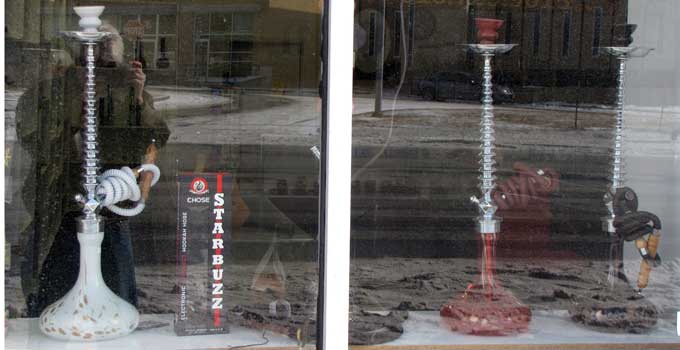 Hookah smoking shops like those spreading in Midtown and nationwide are prompting health warnings.
Hookah smoking shops like those spreading in Midtown and nationwide are prompting health warnings.
Some seem to think that hitting the hookah water pipe is safer than drags on cigarettes.
Not so, say the Centers for Disease Control and Prevention and also local health experts. The water doesn’t stop the bad stuff.
“You get as much if not more of the toxins and tars,” said Dr. Donald Potts, co-chair of the Tobacco Use Reduction Committee of the Kansas City Heath Commission.
“All the water does is cool down the temperature of the smoke but the problem is when it cools down, you’re more apt to take it in deeper,” he said.
Add to that the fact that nicotine is more addictive than heroin, he said. And both drugs never go away.
Hookah use began centuries ago in Persia and India and is gaining popularity in the United States and around the world, the CDC reported in December.
Use by youth and college students in the United States is also increasing. A 2010 survey found that 17 percent of male high school seniors and 15 percent of their female counterparts had used a hookah in the past year.
Other studies show past-year use for college students ranging from 22 to 40 percent.
Some use new forms of electronic smoking that turn chemicals into vapor, and the CDC says little is known about how safe that is.
As for burning tobacco in the hookah pipes, the smoke has high levels of carbon monoxide, metals and cancer causing chemicals, the CDC reports.
“The amount of smoke inhaled during a typical hookah session is about 90,000 (ml) milliliters compared to 500-600 ml inhaled when smoking a cigarette,” it reports.
“An hour-long hookah smoking session involves 200 puffs, while smoking an average cigarette involves 20 puffs.”
Potts said that hookah shops are allowed under the city non-smoking law in the category of tobacco shops.
When the city passed the law, it exempted such shops as well as the politically powerful casinos, he said.
He opposed the exemptions partly because of dangers to employees from second-hand smoke, he said.
Those who chose to smoke have that right but they and society pay, he said. “Everybody’s health insurance rates go up because of the illness these people bring upon themselves.”
Potts said he will soon start a clinic to help smokers quit, but many fail in the attempt. Far better not to start, he said.



Who’s talking